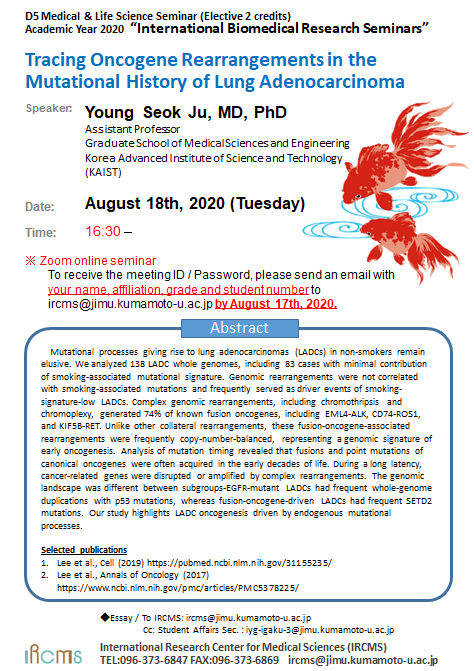- HOME
- News & Events
- [Aug.18] D5 Medical & Life Science Seminar-Dr. Young Seok Ju
News & Events
[Aug.18] D5 Medical & Life Science Seminar-Dr. Young Seok Ju
August 7 2020
The "D5 Medical & Life Science Seminar" course will be offered by International Research Center for Medical Sciences (IRCMS). It will run from April 2020 to March 2021, with lectures given by scientists who are affiliated with IRCMS or in collaboration with researchers at IRCMS. The lectures will be given once a month, in English, and by leading scientists in the relevant research field. Students will be taught: 1) how normal physiological functions are maintained in the human body; 2) how these systems become abnormal under certain pathophysiologic conditions; 3) why stem cells are important in animal development and homeostasis; 4) how stem cell-based approaches can help us understand disease mechanisms and find potential cure for diseases related to stem cell malfunction (e.g., cancer, aging).
Date : August 18, 2020 (Tuesday)
Time : 16:30 -
* Zoom online seminar
To receive the meeting ID / Password, please send an email to
ircms@jimu.kumamoto-u.ac.jp by August 17, 2020.
Please include your name, affiliation, grade and student number in your email.
Speaker : Young Seok Ju, MD, PhD
Assistant Professor,
Korea Advanced Institute of Science and Technology (KAIST)
Title : Tracing Oncogene Rearrangements in the Mutational History of
Lung Adenocarcinoma
Abstract :
Mutational processes giving rise to lung adenocarcinomas (LADCs) in non-smokers remain elusive. We analyzed 138 LADC whole genomes, including 83 cases with minimal contribution of smoking-associated mutational signature. Genomic rearrangements were not correlated with smoking-associated mutations and frequently served as driver events of smoking-signature-low LADCs. Complex genomic rearrangements, including chromothripsis and chromoplexy, generated 74% of known fusion oncogenes, including EML4-ALK, CD74-ROS1, and KIF5B-RET. Unlike other collateral rearrangements, these fusion-oncogene-associated rearrangements were frequently copy-number-balanced, representing a genomic signature of early oncogenesis. Analysis of mutation timing revealed that fusions and point mutations of canonical oncogenes were often acquired in the early decades of life. During a long latency, cancer-related genes were disrupted or amplified by complex rearrangements. The genomic landscape was different between subgroups-EGFR-mutant LADCs had frequent whole-genome duplications with p53 mutations, whereas fusion-oncogene-driven LADCs had frequent SETD2 mutations. Our study highlights LADC oncogenesis driven by endogenous mutational processes.
Selected publications
- Lee et al., Cell (2019) https://pubmed.ncbi.nlm.nih.gov/31155235/
- Lee et al., Annals of Oncology (2017) https://www.ncbi.nlm.nih.gov/pmc/articles/PMC5378225

